Photographs: Dylan Martinez/Reuters Pallavi Aiyar in Brussels
Following 10 days of political drama, the spotlight in Europe shifted to more technical matters on Monday, with finance ministers of the 17-member Euro zone gathering this evening at Brussels, the headquarters of the European Union.
The finance chiefs face the daunting task of putting flesh on the bare bones of the agreement reached by EU leaders last month, intended to stem the fiscal bleed afflicting the region.
They will have to wrestle with devising the methodology by which the EFSF (European Financial Stability Facility), the euro zone's bailout fund, might be leveraged to multiply its firepower to some Euro1 trillion.
. . .
Brussels: Finance ministers begin the daunting task
Image: Euro notes are spread out at a bank branch in Madrid.Photographs: Andrea Comas/Reuters
This will involve figuring out the mechanism by which a percentage of future bond sales could be insured by the EFSF.
Even trickier will be the issue of setting up a special purpose investment vehicle, via which funds from the International Monetary Fund and other countries, notably China, might be solicited.
It became clear, at the G20 meeting last week, that for the moment there are few takers for the SPIV.
German chancellor Angela Merkel was forced into telling reporters that 'hardly any countries here said they will join up' with the EFSF.
French president Nicolas Sarkozy said a deal may not materialise before February, a wait that markets are not likely to appreciate.
. . .
Brussels: Finance ministers begin the daunting task
Image: Prime Minister Dr Manmohan Singh in a group photo with the G-20 leaders, in Cannes.Photographs: PIB
Potential investors were frightened off from immediate offers of money by the unpredictable yo-yoing of events in Greece, the country at the heart of the euro zone's predicament.
The Greek prime minister, George Papendreou, shocked European leaders and markets just a few days after the October 26 bailout deal was triumphantly unveiled by announcing his intention of holding a referendum on the issue.
After days of political contortions, he finally scrapped plans for the vote and resigned from his post late on Sunday, to make way for a national unity government that is expected to approve the bailout package in its entirety.
. . .
Brussels: Finance ministers begin the daunting task
Image: Anti G20 demonstrators wearing masks of Germany's Chancellor Angela Merkel (L) and France's President Nicolas Sarkozy take part in an action against globalisation in Nice.Photographs: Yves Herman/Reuters
However, despite some signs of the return of political stability in Athens, the finance ministers' meeting will take place in a very different environment to that of Euro leaders last month.
The markets had cheered the October 26 package.
Since then, the fiscal contagion the package was meant to contain has already spilled over to economic heavyweight Italy.
Italian borrowing rates rose to a euro-era record high on Monday, a sign investors are losing confidence in the country's creaking finances.
The yield on Italian 10-year bonds increased to 6.64 per cent, up from 6.1 per cent a week before and dangerously close to the seven per cent that drove Ireland and Portugal into EU-IMF bailouts.
The rise came amid increased political uncertainty in Italy, with reports that Prime Minister Silvio Berlusconi might soon resign.
. . .
Brussels: Finance ministers begin the daunting task
Image: A worker counts US dollar bills at a money changer in Manila.Photographs: Romeo Ranoco/Reuters
He faces a crunch vote on Tuesday on public finances.
Monday's meeting also comes at a time when the possibility of a Greek exit from the euro zone is openly being discussed, after having been taboo as recently as a week before.
The Greek PM's resignation followed intense pressure from Merkel and Sarkozy, who gave Greece an ultimatum to pass the bailout package or prepare to leave the Euro.
European Union finance commissioner Olli Rehn also warned Athens on Sunday to shape up or ship out.
He told Reuters news agency that while Brussels did not want Greece to leave the euro zone, it was preparing for 'every scenario for the sake of safeguarding financial stability and saving the Euro'.
. . .
Brussels: Finance ministers begin the daunting task
Image: France's President Nicolas Sarkozy, Germany's Chancellor Angela Merkel, US President Barack Obama and Britain's Prime Minister David Cameron (L to R) at the G20 Summit.Photographs: Yves Herman/Reuters
Morgan Stanley's head of global economics, Joachim Fels, warned in a note to clients that talk of Greece leaving the euro had opened a 'Pandora's Box' which could 'potentially lead to runs on sovereigns and banks in peripheral countries that make everything we have seen so far in this crisis look benign'.
As a result, what was meant to have been a meeting to cement the 'success' of Europe's 'comprehensive' crisis package looks set to turn into a damage limitation exercise, instead.
Finance ministers will have their work cut out to ensure the hoped-for 'big bazooka' with which to stun markets into acquiescence doesn't morph into a puny pichkari instead.

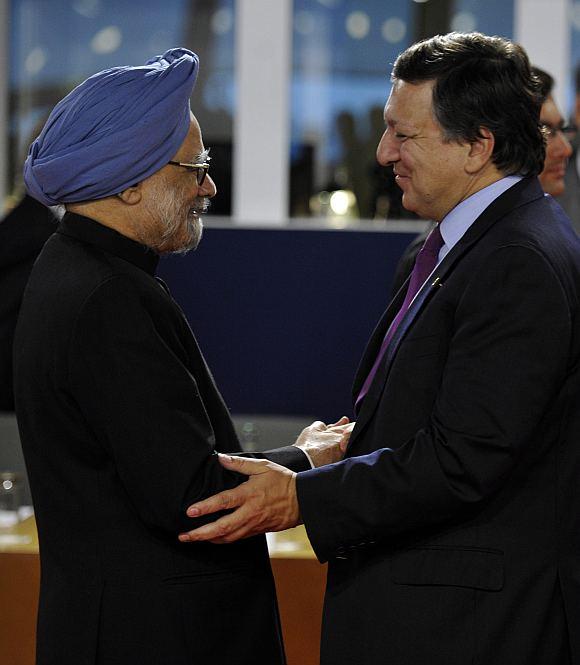
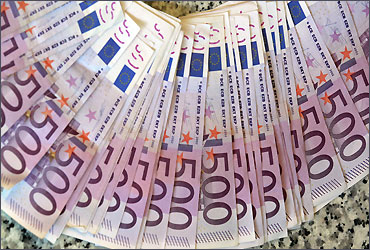
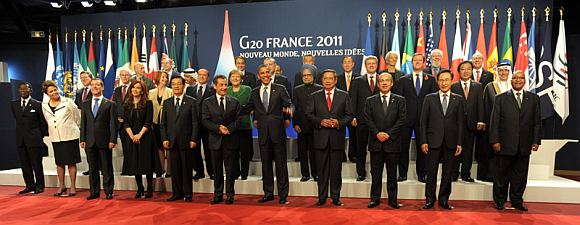

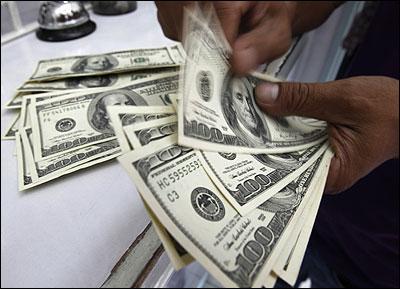
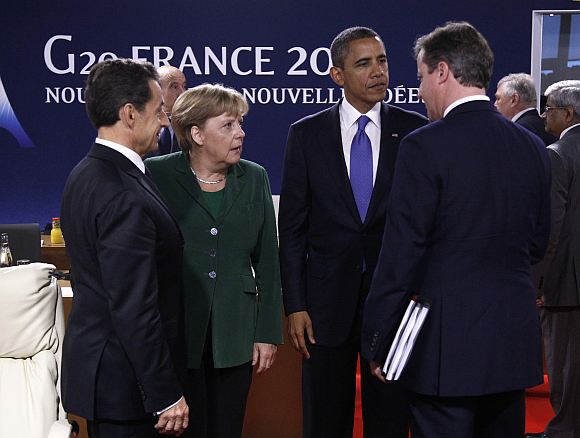

article